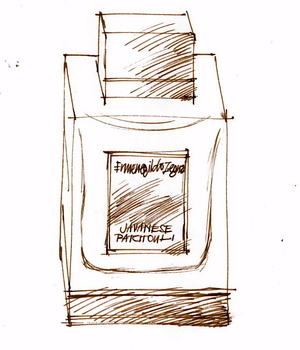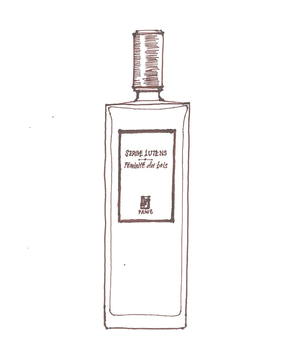Tagged With ‘cedar wood’
Ermenegildo Zegna
Javanese Patchouli
4 July, 2015

Patchouli – a tropical plant in the mint family – has been used as a perfume for centuries. The story goes that it was introduced to the West by Chinese and Indian traders, who used its leaves in bundles of silk as a moth repellent. The perfume oil is extracted from the leaves of several closely related species belonging to the Pogostemon family, which are grown commercially across Asia and West Africa.
For many people the scent remains indelibly associated with the hippy era, when miasmatic waves of cheap patchouli oil belched forth from bong shops and student campuses across the Western world.
But while there’s still cheap patchouli around (try visiting Camden Market over a sweaty weekend), the highest quality oils have a completely different character. Light rather than heavy, fresh rather than sweaty, top-notch patchouli is a refined, delicious fragrance, working equally well on its own or in combination with other perfume ingredients – which is why it’s so widely used in perfumery still.
There aren’t, though, that many really classy men’s perfumes in which patchouli is the dominant scent – I guess because perfume companies feel that those unfortunate hippy associations are still too strong. Givenchy Gentleman used to be a fine men’s example, but sadly it has been reformulated in recent years and isn’t a patch on its previous incarnation, so it’s been great to discover Javanese Patchouli, from the smart Italian business-suit brand Ermenegildo Zegna.
Javanese Patchouli is one of six ‘premium’ perfumes in Zegna’s ‘Essenze’ collection, which was launched in 2012. Each of the perfumes is built around a single scent, sourced from a single country or region: apart from Javanese Patchouli there’s Haitian Vetiver, Italian Bergamot, Indonesian Oud, Sicilian Mandarin and Florentine Iris.
Each 125ml bottle in the Essenze range currently (in mid-2014) costs £140, so they’re certainly not cheap; by comparison a 100ml bottle of Zegna’s Uomo scent costs £60, less than half as much. But – and I hope by now I don’t automatically associate quality with price – the two I’ve tried so far do feel luxurious and refined.
Javanese Patchouli smells, to me, like nothing else, in the sense that all I smell is patchouli, of the highest quality. Given that it’s such a lovely, gentle smell that’s absolutely fine with me, though apparently its ingredients also include soft, faintly chocolatey tonka bean, cedar wood, bergamot and pink pepper. I can’t smell any of those, but perhaps my nose is simply not sensitive enough; if they help make this perfume smell as good as it does, though, I’m perfectly happy that they’re there. I only wish I knew who the perfumer was so I could congratulate her or him.
The bottle (which after all is part of what you’re buying) is well made too, in heavy glass with a black magnetic cap that clonks satisfyingly in place, like the door of an expensive limousine. It’s not, perhaps, quite as sophisticated a design as comparable ‘premium’ perfumes from Dior or Chanel, but at least it’s not hideous or tacky, which all too many contemporary perfume bottles are. And the box it comes in conceals some rather clever cardboard technology, which locks the bottle snugly into place in an oddly pleasing way.
My only criticism, I suppose, is that I can’t smell it on my skin for very long. I was going to say that’s a bit of a swizz, since for £140 you’d hope to get something that didn’t disappear so fast, but I’m told that other people can smell it hours after I can, so at least someone else will get the benefit of your investment.
Serge Lutens
Féminité du Bois
20 October, 2014
 Féminité du Bois was launched in 1992 for Shiseido, the Japanese beauty company for which Serge Lutens created many striking ad campaigns, and which backed him in the launch, the same year, of his super-chic Salons du Palais Royal. It was in its original incarnation that I first encountered Féminité du Bois, and what first caught my eye was the design of the bottle – a lovely teardrop-shaped glass container, designed by Lutens himself.
Féminité du Bois was launched in 1992 for Shiseido, the Japanese beauty company for which Serge Lutens created many striking ad campaigns, and which backed him in the launch, the same year, of his super-chic Salons du Palais Royal. It was in its original incarnation that I first encountered Féminité du Bois, and what first caught my eye was the design of the bottle – a lovely teardrop-shaped glass container, designed by Lutens himself.
Sadly that style of bottle disappeared in 2009, when Lutens left Shiseido and set up in his own name; the perfume went with him, repackaged in his signature bottles – a tall, slim, rather flat rectangular design, stylish in its own right but not as poetic as Shiseido’s original.
Recommending a perfume called Féminité du Bois to men might sound like a rather capricious (not to say perverse) enterprise, but many great fragrances transcend the gender associations that their names, and their marketing, impose on them, and this is one of the most beautiful fragrances I know.
Floral scents may be thought of as quintessentially feminine, and it would take a very confident man to wear something that smelled predominantly, say, of jasmine or of rose. Yet some of the most popular men’s perfumes have flowers in them – violets in Grey Flannel, for example, or jasmine in Eau Sauvage.
Féminité du Bois is, if you like, a mirror image of these kinds of men’s fragrance: a nominally female fragrance made more, rather than less alluring by the addition of elements that are generally associated with the opposite sex. The master stroke, in this case, is the combination of sweet, rather girly smells – violets and plum (the fruit rather than the flower) – with the masculine, pencil-shaving smell of cedar wood.
It’s one of those combinations that works so well that you wonder why nobody had thought of it before, but I guess that’s the mark of genius – in this case the genius of British perfumer Christopher Sheldrake (who worked on many of the Serge Lutens fragrances before getting snapped up by Chanel) and the legendary Pierre Bourdon (Cool Water, Kouros and many others).
The first time I tried out Féminité du Bois my reaction was ‘This smells exactly like Bel Ami’. Which is to say, like pencil shavings, which is the main – and very appealing – impression you get from the classic Hermès scent. But moments later you realise that there’s more going on inside the woodiness, and the warmth and slight sweetness of plum, violets and spices blend with the cedar to make an effortlessly satisfying whole.
Luxury can mean different things to different people: for some, bling is the thing, but for others luxury means high quality and discretion – and that’s the kind of luxury Féminité du Bois suggests to me. It’s neither brash nor overpowering, which makes it eminently wearable, but nor is it faint or feeble. Try it for yourself and I hope you’ll see what I mean.